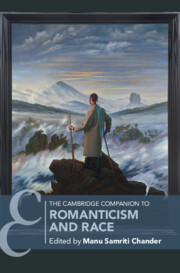Book contents
- The Cambridge Companion to Romanticism and Race
- The Cambridge Companion to Romanticism and Race
- Copyright page
- Contents
- Figures
- Contributors
- Acknowledgments
- Introduction
- Chapter 1 Burke and Kant on Color and Inheritance
- Chapter 2 Breathing Freedom in the Era of the Haitian Revolution
- Chapter 3 Afropessimism, Queer Negativity, and the Limits of Romanticism
- Chapter 4 Samuel Taylor Coleridge’s Racial Imaginary
- Chapter 5 (Not)freedom
- Chapter 6 Disability and Race
- Chapter 7 The Crip Foundations of Romantic Medicine
- Chapter 8 The Voice of Complaint
- Chapter 9 Romantic Manscapes
- Chapter 10 Romantic Poetry and Constructions of Indigeneity
- Chapter 11 Romanticism and the Novel(ty) of Race
- Chapter 12 Reading Race Along the “Bounding Line”
- Chapter 13 The Racecraft of Romantic Stagecraft
- Further Reading
- Index
- Cambridge Companions To Literature
Chapter 13 - The Racecraft of Romantic Stagecraft
Published online by Cambridge University Press: 21 November 2024
- The Cambridge Companion to Romanticism and Race
- The Cambridge Companion to Romanticism and Race
- Copyright page
- Contents
- Figures
- Contributors
- Acknowledgments
- Introduction
- Chapter 1 Burke and Kant on Color and Inheritance
- Chapter 2 Breathing Freedom in the Era of the Haitian Revolution
- Chapter 3 Afropessimism, Queer Negativity, and the Limits of Romanticism
- Chapter 4 Samuel Taylor Coleridge’s Racial Imaginary
- Chapter 5 (Not)freedom
- Chapter 6 Disability and Race
- Chapter 7 The Crip Foundations of Romantic Medicine
- Chapter 8 The Voice of Complaint
- Chapter 9 Romantic Manscapes
- Chapter 10 Romantic Poetry and Constructions of Indigeneity
- Chapter 11 Romanticism and the Novel(ty) of Race
- Chapter 12 Reading Race Along the “Bounding Line”
- Chapter 13 The Racecraft of Romantic Stagecraft
- Further Reading
- Index
- Cambridge Companions To Literature
Summary
Yasser Khan reminds us that race, simply put, is made. It is the consequence of painstaking and deliberate work, whether in the meticulous anthropological taxonomies offered by Kant and Blumenbach, or in the line of poetry, or, as Khan argues, in the representation of racial differences on the Romantic-era stage. Drawing on the notion of “racecraft,” which “foregrounds racism as a reality that produces ‘race’ to rationalize the dispossession of wealth, power, and rights,” Khan shows how stagecraft in John Fawcett’s Obi; or Three-Finger’d Jack (1800) establishes the terms by which racialized subjects come to be understood as fundamentally exploitable.
- Type
- Chapter
- Information
- The Cambridge Companion to Romanticism and Race , pp. 227 - 245Publisher: Cambridge University PressPrint publication year: 2024

